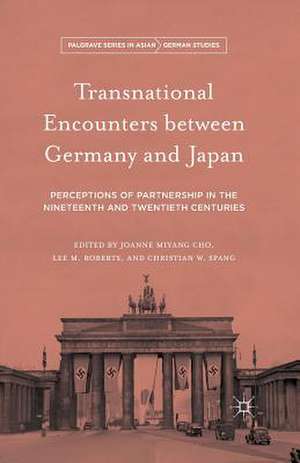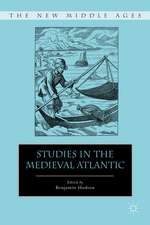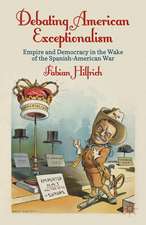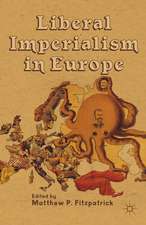Transnational Encounters between Germany and Japan: Perceptions of Partnership in the Nineteenth and Twentieth Centuries: Palgrave Series in Asian German Studies
Editat de Joanne Miyang Cho, Lee Roberts, Christian W. Spangen Limba Engleză Paperback – 16 dec 2015
| Toate formatele și edițiile | Preț | Express |
|---|---|---|
| Paperback (1) | 637.59 lei 6-8 săpt. | |
| Palgrave Macmillan US – 16 dec 2015 | 637.59 lei 6-8 săpt. | |
| Hardback (1) | 729.06 lei 6-8 săpt. | |
| Palgrave Macmillan US – 15 dec 2015 | 729.06 lei 6-8 săpt. |
Preț: 637.59 lei
Preț vechi: 750.11 lei
-15% Nou
Puncte Express: 956
Preț estimativ în valută:
122.03€ • 126.92$ • 102.26£
122.03€ • 126.92$ • 102.26£
Carte tipărită la comandă
Livrare economică 13-27 martie
Preluare comenzi: 021 569.72.76
Specificații
ISBN-13: 9781349579440
ISBN-10: 1349579440
Pagini: 280
Ilustrații: IX, 280 p.
Dimensiuni: 140 x 216 x 18 mm
Greutate: 0.34 kg
Ediția:1st ed. 2016
Editura: Palgrave Macmillan US
Colecția Palgrave Macmillan
Seria Palgrave Series in Asian German Studies
Locul publicării:New York, United States
ISBN-10: 1349579440
Pagini: 280
Ilustrații: IX, 280 p.
Dimensiuni: 140 x 216 x 18 mm
Greutate: 0.34 kg
Ediția:1st ed. 2016
Editura: Palgrave Macmillan US
Colecția Palgrave Macmillan
Seria Palgrave Series in Asian German Studies
Locul publicării:New York, United States
Cuprins
Introduction; Joanne Miyang Cho, Lee M. Roberts, and Christian W. Spang
PART I: AMBIVALENT PARTNERS IN MODERNIZATION
1. The Myth of the 'Familiar Germany': German-Japanese Relationships in the Meiji Period Reexamined; Toru Takenaka
2. Karl von Eisendecher and Japan: Transnational Encounters and the Diplomacy of Imperialism; Sven Saaler
3. Count Hermann Keyserling's View of Japan: A Nation of Consummate Imitators; Joanne Miyang Cho
4. Western Criticism of an Occidental East: A German View of the Modernization of Japanese Literature, 1900-1945 ; Lee M. Roberts
PART II: TRANSNATIONAL PARTNERS BETWEEN TWO WORLD WARS
5. When Jiu-jitsu was German: Japanese Martial Arts in German Sport and Körperkultur, 1905-1933; Sarah Panzer
6. Anna and Siegfried Berliner: Two Academic Bridge Builders between Germany and Japan; Hans K. Rode† and Christian W. Spang
7. The Expansion of Activities of the German East Asiatic Society (OAG) during the Nazi Era; Christian W. Spang
8. Japanese Ambivalence towards Jewish Exiles in Japan; Thomas Pekar
PART III: POST-WORLD WAR II AFFINITY: PARIAH NATIONS?
9. The Nuremberg and Tokyo IMT Trials: A Comparative Analysis; David M. Crowe
10.A 'Penologic Program' for Japanese and German War Criminals, 1945-1958; Franziska Seraphim
11.German-Japanese Relations after the Second World War; Rolf-Harald Wippich
12.Peace, Business, and Classical Culture: The Relationship Between the German Democratic Republic and Japan; Volker Stanzel
13.Transnational Communicability: German-Japanese Literature by Yoko Tawada; Birgit Maier-Katkin and Lee M. Roberts
PART I: AMBIVALENT PARTNERS IN MODERNIZATION
1. The Myth of the 'Familiar Germany': German-Japanese Relationships in the Meiji Period Reexamined; Toru Takenaka
2. Karl von Eisendecher and Japan: Transnational Encounters and the Diplomacy of Imperialism; Sven Saaler
3. Count Hermann Keyserling's View of Japan: A Nation of Consummate Imitators; Joanne Miyang Cho
4. Western Criticism of an Occidental East: A German View of the Modernization of Japanese Literature, 1900-1945 ; Lee M. Roberts
PART II: TRANSNATIONAL PARTNERS BETWEEN TWO WORLD WARS
5. When Jiu-jitsu was German: Japanese Martial Arts in German Sport and Körperkultur, 1905-1933; Sarah Panzer
6. Anna and Siegfried Berliner: Two Academic Bridge Builders between Germany and Japan; Hans K. Rode† and Christian W. Spang
7. The Expansion of Activities of the German East Asiatic Society (OAG) during the Nazi Era; Christian W. Spang
8. Japanese Ambivalence towards Jewish Exiles in Japan; Thomas Pekar
PART III: POST-WORLD WAR II AFFINITY: PARIAH NATIONS?
9. The Nuremberg and Tokyo IMT Trials: A Comparative Analysis; David M. Crowe
10.A 'Penologic Program' for Japanese and German War Criminals, 1945-1958; Franziska Seraphim
11.German-Japanese Relations after the Second World War; Rolf-Harald Wippich
12.Peace, Business, and Classical Culture: The Relationship Between the German Democratic Republic and Japan; Volker Stanzel
13.Transnational Communicability: German-Japanese Literature by Yoko Tawada; Birgit Maier-Katkin and Lee M. Roberts
Recenzii
“This volume surveys key moments in Japanese–German relations from the midnineteenth to the late twentieth century with richly informed materials from a variety of perspectives. … reviewer highly recommends this book to students and scholars interested in emerging fields of transnational studies and Asian German studies. The volume … prepares a readership for more specialized studies that may eventually develop compelling methodologies and concepts for the booming field of global history based on the archive of Asian German Studies.” (Chunjie Zhang, Monatshefte, Vol. 109 (3), 2017)
“Transnational Encounters between Germany and Japan: Perceptions of Partnership in the Nineteenth and Twentieth Centuries is an anthology of scholarly essays by diverse authors discussing intersections and common themes between German and Japanese cultures over the past one hundred and fifty years. … An index enhances this erudite, meticulously researched and presented compilation, highly recommended especially for college library World History or International Studies collections.” (Mid West Book Review Library Bookwatch, midwestbookreview.com, February, 2016)Notă biografică
Joanne Miyang Cho is Professor and Chair of History at William Paterson University of New Jersey, USA. She is the co-editor of Transcultural Encounters between Germany and India (2013) and Germany and China: Transnational Encounters since the Eighteenth Century (2014). She is also the co-editor of Palgrave Series in Asian German Studies. Her research focus is Asian German studies and she is currently working on German-Korean relations and German-Asian gender relations.
Lee M. Roberts is Associate Professor of German Language and Literature at Indiana University-Purdue University, Fort Wayne, USA. He specializes in Asian-German cultural relations. Representative publications include Germany and the Imagined East (2005; 2009) and Literary Nationalism in German and Japanese Germanistik (2010). He is co-editor of Palgrave Series in Asian German Studies.
Christian W. Spang is Associate Professor of German Studies at Dait? Bunka University, Tokyo, Japan. His research deals with German-Japanese relations in the 19th and 20th century. He authored Karl Haushofer und Japan (2013) and co-edited Japanese-German Relations, 1895-1945 (2006) and Heinz Altschul: 'As I Record These Memories . . .' (2014). A co-authored history of the German East Asiatic Society (OAG) is forthcoming in German.
Lee M. Roberts is Associate Professor of German Language and Literature at Indiana University-Purdue University, Fort Wayne, USA. He specializes in Asian-German cultural relations. Representative publications include Germany and the Imagined East (2005; 2009) and Literary Nationalism in German and Japanese Germanistik (2010). He is co-editor of Palgrave Series in Asian German Studies.
Christian W. Spang is Associate Professor of German Studies at Dait? Bunka University, Tokyo, Japan. His research deals with German-Japanese relations in the 19th and 20th century. He authored Karl Haushofer und Japan (2013) and co-edited Japanese-German Relations, 1895-1945 (2006) and Heinz Altschul: 'As I Record These Memories . . .' (2014). A co-authored history of the German East Asiatic Society (OAG) is forthcoming in German.
Textul de pe ultima copertă
Showcasing moments of convergence between the German and Japanese cultures towards common points of interest over the last one hundred fifty years, the chapters in this book cover such topics as culture, diplomacy, geography, history, law, literature, philosophy, politics, and sports. From the creation of two similar modern nation-states, to the aggressive struggle for national supremacy and subsequent total defeat in 1945, the necessity of coping with their earlier militarism and parallel economic miracles in the postwar era, Germans and Japanese look back on a remarkably similar past.





















